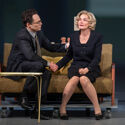 My advice has always been the same for gay athletes: Your sport is what makes up who you are more than your sexuality. It’s the biggest part of your life. You do it day-in and day-out. Number one, you need to make sure you’re supported to begin with. The last thing you want to have is to lose your position in your sport. I know for some people that has happened, and that’s a sad situation, but I think as we progress, it isn’t going to happen anymore because there are people out there who are creating awareness and supporting those people who want to come out. We’ve seen a lot of great movement, especially in the college level where athletes are being supported and are coming out, and the teams, colleges, everybody is getting behind them. That’s just going to trickle down to more universities, more colleges, and it’s going to make it easier for everybody.”
My advice has always been the same for gay athletes: Your sport is what makes up who you are more than your sexuality. It’s the biggest part of your life. You do it day-in and day-out. Number one, you need to make sure you’re supported to begin with. The last thing you want to have is to lose your position in your sport. I know for some people that has happened, and that’s a sad situation, but I think as we progress, it isn’t going to happen anymore because there are people out there who are creating awareness and supporting those people who want to come out. We’ve seen a lot of great movement, especially in the college level where athletes are being supported and are coming out, and the teams, colleges, everybody is getting behind them. That’s just going to trickle down to more universities, more colleges, and it’s going to make it easier for everybody.”
— Blake Skjellerup, Olympian speed skater and Gay Games ambassador, offering advice to LGBT athletes who haven’t yet come out publicly in a new interview with CleveScene




















enlightenone
He’s an athlete, NOT a psychologist! Your sexuality is an integral part of WHAT you are 24/7, 365 days a year, asleep or awake! “Your sport,” IF YOU HAVE ONE, at any given time, tends to be a part of your identity (WHO) if it is a part of your career. Your sport can and does change, you’re sexuality does not! The last thing you want to do is repress your sexuality so you can play a sport “OR NOT LOOSE YOUR POSITION.” That should be the lifesaving, quality-of-life lesson!
enlightenone
That’s “LOSE.”
Kieru
@enlightenone: I feel that his comments are in the context of “You as an athlete” rather than “You as a human-being”. And it seemed to me that he was speaking exclusively OF identity.
As an athlete, particularly one of professional or olympic renown, your sport IS var more important to your identity than your sexuality.
enlightenone
@Kieru: I knew what he meant, but it is an illusion/self-deception! If you as a gay human being “repress,” deny, devalue, not tend to, or place restrictions on a CORE part of your self/identity, whatever the rationale, you suffer psychological and spiritual pain. Blake knows it first-hand, as well as revealing how not being “out” impacted his level of achievement in his “sport!” Does Ian Thorpe ring a bell?
drivendervish
I think Blake’s advice sucks and I hope he stops sharing it with closeted gay athletes. Your sexuality is a huge part of who you are and accepting yourself is the first big step and then being yourself with other people is another big step. But until you do both you won’t be able to give your sport all of the energy and devotion it takes to be the best in the world.
Tackle
If your’re going to give advice, make sure you are clear and precise, articulating your point well. I agree with@enlightenone: and I also @Kieru: and@drivendervish: , to some extant. Without articulating a point well, or advice given, it’s going to be, I think he means this, or he means that. You leave things too open for interpretation. And that’s not good. Because it’s your advice. I will say this: there was no need for him to compare sport and sexuality.
enlightenone
@Tackle: Thank you for the validation! It’s not an either or first or second. You need one (sexuality); you want the other (your sport). Both can be integrated, it’s a matter of what it will look like – how it will manifest. There is always a “price” to pay when you are not authentic in the world!
enlightenone
@Kieru: “As an athlete, particularly one of professional or olympic renown, your sport IS var more important to your identity than your sexuality.”
This indicates a stage of development not yet reached. This is why I strongly oppose people, “celebrities” in particular, not be rewarded for coming out of the “closet” and anointed a “hero” and role model. From my professional perspective, Michael Sam is the exception! From what I ascertain from his story, he was never in the “closet!”
SteveDenver
I understand his position, but I strongly disagree.
Athletes, actors, politicians and other public figures who have come out strong often report that they feel unshackled and released from shame and fear of exposure.
How oppressive to always be looking over one’s shoulder to see if anyone see you hug, kiss, hold hands, go into a certain business/restaurant/bar, attend an event, own a certain magazine, make a comment online, or get “caught” in any number of ways.